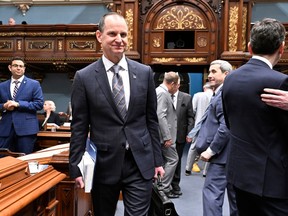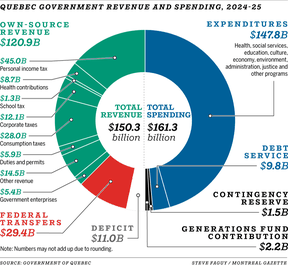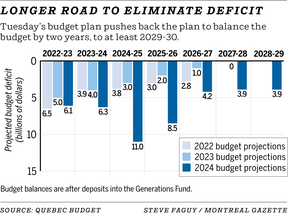Finance minister announces tax and spending review and pushes a projected balanced budget two years down the road to 2029-2030.

Article content
QUEBEC — The health and education budgets emerge unscathed and even grow.
But with a perfect storm of a stagnant economy, sliding revenues and increased spending painting him into a corner, Quebec Finance Minister Eric Girard Tuesday chose the road “more travelled” by modern governments that find themselves in such a bind. Rather than make massive cuts in spending, he has extended the runway before Quebec returns to balanced books.
Advertisement 2
Article content
Article content
In other words, Girard has put off some very complicated decisions in the hopes the situation — which finance officials qualify as volatile but temporary — turns around.
For now that means if there were still Quebecers who had hopes of getting more of those $400 “inflation shield” cheques or another income tax cut as was the case in 2023, the budget Girard tabled Tuesday in the National Assembly is bound to disappoint. The well has run dry.
Adding insult to injury for some people, Quebec is making it more expensive for smokers to light up as of midnight Wednesday.
But in a budget he has described as among the most demanding of his career, Girard is betting Quebecers will be happier that health and education services are not being cut and will in theory improve than sitting around fretting about the $11-billion deficit he has forecast for 2024-2025.
That projected deficit stole the headlines of the budget. It is the highest, in absolute dollars, in Quebec’s history, Girard conceded at a news conference.

He argued the COVID-19 pandemic, where the deficit soared in 2021 to $10.7 billion, is still affecting the province’s books. Some of the expenses associated with that crisis, such as stockpiling masks and vaccination clinics, have emerged as permanent costs to the state.
Advertisement 3
Article content
But he said, measured against GDP, Quebec has had higher deficits in the past.
“I would suggest to you today, that this deficit is manageable,” he said. “What we are proposing to Quebecers is to prioritize health and education immediately and then gradually return to fiscal balance through concrete steps.”
The government’s spending estimates, made public at the same time by Treasury Board President Sonia LeBel, reveal the Coalition Avenir Québec government’s current priorities. Government spending in heath and education — which represent two thirds of all its annual budget — are going up significantly, largely owing to recently negotiated public-sector wage increases.
The budget reveals, for the first time, that the common front agreements, mostly negotiated before Christmas, will cost taxpayers $3 billion extra a year for the next three years of the agreement.
The result is health and social services gets $3.7 billion more, a 4.2 per cent increase, because salaries are going up. Education gets an additional $1.3 billion or 7.6 per cent more.
Overall, Quebec plans to spend $157 billion in 2024-2025, an increase of 7.8 per cent. Girard tops up other key spending priority areas including immigration and shoring up the French language.
Advertisement 4
Article content
In targeting a few spending areas, Girard has avoided, for now, the pitfall previous governments have fallen into when the economy tanked and revenues, including from cash cow Hydro-Québec, plunged. He is not imposing any unpopular across-the-board spending cuts, the kind the Liberals used in their years in power.

Those proved disastrous politically.
On the other hand, to stave off accusations he has his head in the sand about what looks like a gloomy future, Girard announced a comprehensive review of all of Quebec’s tax and budgetary spending starting this spring. Girard is banking on that review, to be conducted by LeBel, to generate an additional $2.9 billion in revenue over the next five years.
In addition, Girard will present, in next year’s budget, a plan to restore balanced books by 2029-2030. He offered no details Tuesday. That replaces the zero-deficit target of 2027-2028.
“Why 2025-2026 (for the plan)?” Girard said at a news conference. “Because we believe the economic situation will be better by then. By 2025-2026, I will know the destination.”
In the meantime, the 2024-2025 deficit, including the required contribution the debt-fighting Generations Fund, will be $11 billion with Girard hoping it drops to $3.9 billion by 2028-2029.
Advertisement 5
Article content
The budget reveals Quebec is closing the year 2023-2024 with a $6.3 billion deficit instead of the forecast $4 billion.
Girard outlined the things he is counting on to get Quebec out of the hole. While the economy only grew by 0.2 in 2023, and 0.6 per cent in 2024, he is predicting growth of 1.6 per cent in 2025, which he hopes will produce much-needed fresh revenues from taxes.
He nevertheless includes a $7.5 billion contingency reserve over five years “to offset the effects of a more moderate economic growth than anticipated should one occur.”
Girard adds Quebec will continue its efforts to pry a greater share of federal transfers including covering the costs of asylum seekers. Quebec wants an unconditional opt out, with financial compensation, of the Canadian Dental Care Plan.
As of March 31, 2024, Quebec’s net debt stands at $221.1 billion which is 39 per cent of GDP.
Moments after it was presented, the opposition parties took turns ripping apart the budget.
“The CAQ has lost control of public finances,” said Liberal finance critic Frédéric Beauchemin, who said Girard is wearing rose-coloured glasses about balancing the books given the state of the economy.
Parti Québécois Leader Paul St-Pierre Plamondon said Girard’s 2023-2024 budget plan was off the mark. It handed out cheques and income tax cuts, not anticipating the slowdown.
“That (deficit) has nothing to do with the pandemic,” he said, adding Quebec also failed to make promised financial gains from the federal government.
Conservative Party of Quebec Leader Éric Duhaime said all of the government’s 2023-2024 forecasts were wrong, which makes him doubt the new budget will be any better.
“It’s an incompetent budget,” he said. “It’s clear (Girard) is at the end of his rope.”
The business community was also not impressed, saying many of its requests were ignored.
“It’s an empty budget that will have little impact on the economy of productivity of manufacturers,” said Véronique Proulx, president of the Manufacturiers et exportateurs du Québec.
Recommended from Editorial
Advertisement 6
Article content
Article content




